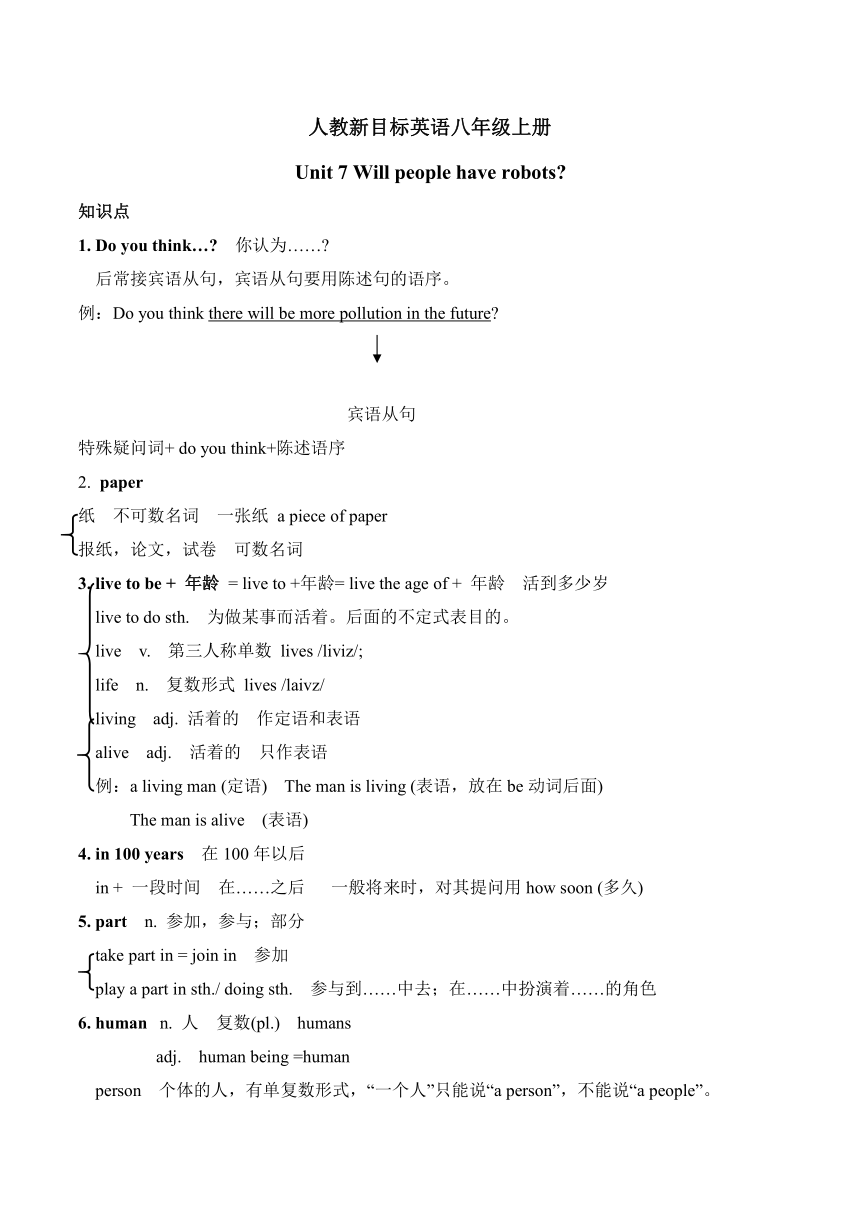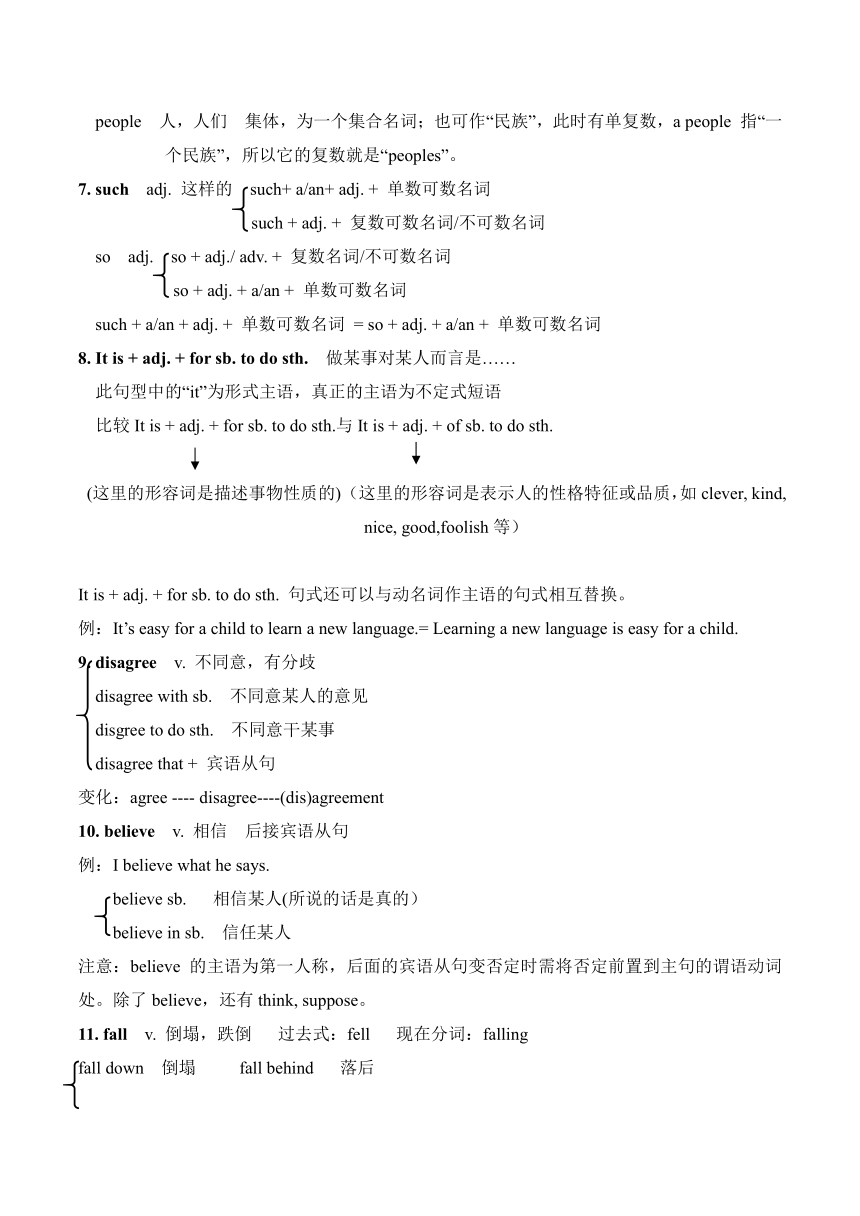unit7 Will people have robots? 单元知识点总结
文档属性
| 名称 | unit7 Will people have robots? 单元知识点总结 |  | |
| 格式 | zip | ||
| 文件大小 | 29.0KB | ||
| 资源类型 | 教案 | ||
| 版本资源 | 人教新目标(Go for it)版 | ||
| 科目 | 英语 | ||
| 更新时间 | 2020-08-12 23:27:18 | ||
图片预览


文档简介
人教新目标英语八年级上册
Unit
7
Will
people
have
robots?
知识点
1.
Do
you
think…?
你认为……?
后常接宾语从句,宾语从句要用陈述句的语序。
例:Do
you
think
there
will
be
more
pollution
in
the
future?
宾语从句
特殊疑问词+
do
you
think+陈述语序
2.
paper
纸
不可数名词
一张纸
a
piece
of
paper
报纸,论文,试卷
可数名词
3.
live
to
be
+
年龄
=
live
to
+年龄=
live
the
age
of
+
年龄
活到多少岁
live
to
do
sth.
为做某事而活着。后面的不定式表目的。
live
v.
第三人称单数
lives
/liviz/;
life
n.
复数形式
lives
/laivz/
living
adj.
活着的
作定语和表语
alive
adj.
活着的
只作表语
例:a
living
man
(定语)
The
man
is
living
(表语,放在be动词后面)
The
man
is
alive
(表语)
4.
in
100
years
在100年以后
in
+
一段时间
在……之后
一般将来时,对其提问用how
soon
(多久)
5.
part
n.
参加,参与;部分
take
part
in
=
join
in
参加
play
a
part
in
sth./
doing
sth.
参与到……中去;在……中扮演着……的角色
6.
human
n.
人
复数(pl.)
humans
adj.
human
being
=human
person
个体的人,有单复数形式,“一个人”只能说“a
person”,不能说“a
people”。
people
人,人们
集体,为一个集合名词;也可作“民族”,此时有单复数,a
people
指“一个民族”,所以它的复数就是“peoples”。
7.
such
adj.
这样的
such+
a/an+
adj.
+
单数可数名词
such
+
adj.
+
复数可数名词/不可数名词
so
adj.
so
+
adj./
adv.
+
复数名词/不可数名词
so
+
adj.
+
a/an
+
单数可数名词
such
+
a/an
+
adj.
+
单数可数名词
=
so
+
adj.
+
a/an
+
单数可数名词
8.
It
is
+
adj.
+
for
sb.
to
do
sth.
做某事对某人而言是……
此句型中的“it”为形式主语,真正的主语为不定式短语
比较It
is
+
adj.
+
for
sb.
to
do
sth.与It
is
+
adj.
+
of
sb.
to
do
sth.
(这里的形容词是描述事物性质的)
(这里的形容词是表示人的性格特征或品质,如clever,
kind,
nice,
good,foolish等)
It
is
+
adj.
+
for
sb.
to
do
sth.
句式还可以与动名词作主语的句式相互替换。
例:It’s
easy
for
a
child
to
learn
a
new
language.=
Learning
a
new
language
is
easy
for
a
child.
9.
disagree
v.
不同意,有分歧
disagree
with
sb.
不同意某人的意见
disgree
to
do
sth.
不同意干某事
disagree
that
+
宾语从句
变化:agree
----
disagree----(dis)agreement
10.
believe
v.
相信
后接宾语从句
例:I
believe
what
he
says.
believe
sb.
相信某人(所说的话是真的)
believe
in
sb.
信任某人
注意:believe
的主语为第一人称,后面的宾语从句变否定时需将否定前置到主句的谓语动词处。除了believe,还有think,
suppose。
11.
fall
v.
倒塌,跌倒
过去式:fell
现在分词:falling
fall
down
倒塌
fall
behind
落后
fall
asleep
熟睡,入睡
12.
possible
adj.
可能存在的或发生的
反义词:impossible
as
...
as
possible
尽可能地......
常见的有:as
soon
as
possible
尽可能快(时间)
as
fast
as
possible
尽可能快(速度)
as
quickly
as
possible
尽可能快
(动作)
as
early
as
possible
尽可能早
(时间)
13.
probably
adv.
很可能,大概
肯定的成分较大
perhaps
也许,是也许如此也许不如此的意思,大体和maybe
同义
possibly
可能,常和can,may,
must
等情态动词连用,比probably的语气弱的多
2、语法(一般将来时)
1.
定义:表示将来某个时间要发生的动作或存在的状态,也表示将来经常或反复发生的动作,常与表示将来的时间状语连用,如tomorrow,
next
week,
next
year,
in
the
future等。
2.
构成:助动词shall/
will
+
动词原形
3.
一般将来时的肯定式、否定式和疑问式如下:(以go为例)
人称
肯定式
否定式
疑问式
第一人称
I/
We
will/
shall
go
I/
We
will/
shall
not
go
Shall/
Will
I/
we
go?
第二人称
You
will
go
You
will
not
go
Will
you
go?
第三人称
He/
She/
It
/
They
will
go
He/
She/
It/
They
will
not
go
Will
he/
she/
it/
they
go?
4.
be
going
to
与
will都可表示将要发生的事、将要去做的事,但有如下几点区别:
be
going
to
will
例句
表示近期的眼下就要发生的事情
表示较远的将来时间
He
is
going
to
write
a
letter
tonight.He
will
write
a
book
one
day.
根据主观判断将来肯定发生的事情
客观上势必发生的事情
He
eats
too
much
and
he
is
going
to
be
fat.He
will
be
twenty
years
old.
含有“计划、准备”的意思
Will无此意
She
is
going
to
lend
us
her
book.He
will
be
here
in
half
an
hour.
5.
There
be
句型的一般将来时
构成:There
will
be
....
(陈述句)
Will
there
be...
(一般疑问句)
There
won’t
be
...
(否定句)
疑问词
+
一般疑问句?
(特殊疑问句)
E.g.
When
will
there
be
a
basketball
match?
Unit
7
Will
people
have
robots?
知识点
1.
Do
you
think…?
你认为……?
后常接宾语从句,宾语从句要用陈述句的语序。
例:Do
you
think
there
will
be
more
pollution
in
the
future?
宾语从句
特殊疑问词+
do
you
think+陈述语序
2.
paper
纸
不可数名词
一张纸
a
piece
of
paper
报纸,论文,试卷
可数名词
3.
live
to
be
+
年龄
=
live
to
+年龄=
live
the
age
of
+
年龄
活到多少岁
live
to
do
sth.
为做某事而活着。后面的不定式表目的。
live
v.
第三人称单数
lives
/liviz/;
life
n.
复数形式
lives
/laivz/
living
adj.
活着的
作定语和表语
alive
adj.
活着的
只作表语
例:a
living
man
(定语)
The
man
is
living
(表语,放在be动词后面)
The
man
is
alive
(表语)
4.
in
100
years
在100年以后
in
+
一段时间
在……之后
一般将来时,对其提问用how
soon
(多久)
5.
part
n.
参加,参与;部分
take
part
in
=
join
in
参加
play
a
part
in
sth./
doing
sth.
参与到……中去;在……中扮演着……的角色
6.
human
n.
人
复数(pl.)
humans
adj.
human
being
=human
person
个体的人,有单复数形式,“一个人”只能说“a
person”,不能说“a
people”。
people
人,人们
集体,为一个集合名词;也可作“民族”,此时有单复数,a
people
指“一个民族”,所以它的复数就是“peoples”。
7.
such
adj.
这样的
such+
a/an+
adj.
+
单数可数名词
such
+
adj.
+
复数可数名词/不可数名词
so
adj.
so
+
adj./
adv.
+
复数名词/不可数名词
so
+
adj.
+
a/an
+
单数可数名词
such
+
a/an
+
adj.
+
单数可数名词
=
so
+
adj.
+
a/an
+
单数可数名词
8.
It
is
+
adj.
+
for
sb.
to
do
sth.
做某事对某人而言是……
此句型中的“it”为形式主语,真正的主语为不定式短语
比较It
is
+
adj.
+
for
sb.
to
do
sth.与It
is
+
adj.
+
of
sb.
to
do
sth.
(这里的形容词是描述事物性质的)
(这里的形容词是表示人的性格特征或品质,如clever,
kind,
nice,
good,foolish等)
It
is
+
adj.
+
for
sb.
to
do
sth.
句式还可以与动名词作主语的句式相互替换。
例:It’s
easy
for
a
child
to
learn
a
new
language.=
Learning
a
new
language
is
easy
for
a
child.
9.
disagree
v.
不同意,有分歧
disagree
with
sb.
不同意某人的意见
disgree
to
do
sth.
不同意干某事
disagree
that
+
宾语从句
变化:agree
----
disagree----(dis)agreement
10.
believe
v.
相信
后接宾语从句
例:I
believe
what
he
says.
believe
sb.
相信某人(所说的话是真的)
believe
in
sb.
信任某人
注意:believe
的主语为第一人称,后面的宾语从句变否定时需将否定前置到主句的谓语动词处。除了believe,还有think,
suppose。
11.
fall
v.
倒塌,跌倒
过去式:fell
现在分词:falling
fall
down
倒塌
fall
behind
落后
fall
asleep
熟睡,入睡
12.
possible
adj.
可能存在的或发生的
反义词:impossible
as
...
as
possible
尽可能地......
常见的有:as
soon
as
possible
尽可能快(时间)
as
fast
as
possible
尽可能快(速度)
as
quickly
as
possible
尽可能快
(动作)
as
early
as
possible
尽可能早
(时间)
13.
probably
adv.
很可能,大概
肯定的成分较大
perhaps
也许,是也许如此也许不如此的意思,大体和maybe
同义
possibly
可能,常和can,may,
must
等情态动词连用,比probably的语气弱的多
2、语法(一般将来时)
1.
定义:表示将来某个时间要发生的动作或存在的状态,也表示将来经常或反复发生的动作,常与表示将来的时间状语连用,如tomorrow,
next
week,
next
year,
in
the
future等。
2.
构成:助动词shall/
will
+
动词原形
3.
一般将来时的肯定式、否定式和疑问式如下:(以go为例)
人称
肯定式
否定式
疑问式
第一人称
I/
We
will/
shall
go
I/
We
will/
shall
not
go
Shall/
Will
I/
we
go?
第二人称
You
will
go
You
will
not
go
Will
you
go?
第三人称
He/
She/
It
/
They
will
go
He/
She/
It/
They
will
not
go
Will
he/
she/
it/
they
go?
4.
be
going
to
与
will都可表示将要发生的事、将要去做的事,但有如下几点区别:
be
going
to
will
例句
表示近期的眼下就要发生的事情
表示较远的将来时间
He
is
going
to
write
a
letter
tonight.He
will
write
a
book
one
day.
根据主观判断将来肯定发生的事情
客观上势必发生的事情
He
eats
too
much
and
he
is
going
to
be
fat.He
will
be
twenty
years
old.
含有“计划、准备”的意思
Will无此意
She
is
going
to
lend
us
her
book.He
will
be
here
in
half
an
hour.
5.
There
be
句型的一般将来时
构成:There
will
be
....
(陈述句)
Will
there
be...
(一般疑问句)
There
won’t
be
...
(否定句)
疑问词
+
一般疑问句?
(特殊疑问句)
E.g.
When
will
there
be
a
basketball
match?
同课章节目录
- Unit 1 Where did you go on vacation?
- Section A
- Section B
- Unit 2 How often do you exercise?
- Section A
- Section B
- Unit 3 I'm more outgoing than my sister.
- Section A
- Section B
- Unit 4 What's the best movie theater?
- Section A
- Section B
- Unit 5 Do you want to watch a game show?
- Section A
- Section B
- Unit 6 I'm going to study computer science.
- Section A
- Section B
- Unit 7 Will people have robots?
- Section A
- Section B
- Unit 8 How do you make a banana milk shake?
- Section A
- Section B
- Unit 9 Can you come to my party?
- Section A
- Section B
- Unit 10 If you go to the party, you'll have a grea
- Section A
- Section B
